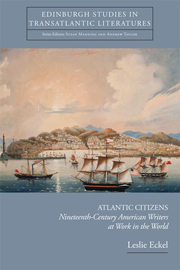Book contents
- Frontmatter
- Contents
- Acknowledgements
- Dedication
- Introduction: The Vocational Routes of American Literature
- 1 Longfellow and the Volume of the World
- 2 Fuller's Conversational Journalism: New York, London, Rome
- 3 ‘A type of his countrymen’: Douglass and Transatlantic Print Culture
- 4 Between Cosmos and Cosmopolis: Emerson's National Criticism
- 5 The Professional Pilgrim: Greenwood Sells the Transatlantic Experience
- 6 Standing Upon America: Whitman and the Profession of National Poetry
- Afterword: Vocation or Vacation? Transatlantic Professionalism Now
- Notes
- Bibliography
- Index
Afterword: Vocation or Vacation? Transatlantic Professionalism Now
Published online by Cambridge University Press: 05 September 2013
- Frontmatter
- Contents
- Acknowledgements
- Dedication
- Introduction: The Vocational Routes of American Literature
- 1 Longfellow and the Volume of the World
- 2 Fuller's Conversational Journalism: New York, London, Rome
- 3 ‘A type of his countrymen’: Douglass and Transatlantic Print Culture
- 4 Between Cosmos and Cosmopolis: Emerson's National Criticism
- 5 The Professional Pilgrim: Greenwood Sells the Transatlantic Experience
- 6 Standing Upon America: Whitman and the Profession of National Poetry
- Afterword: Vocation or Vacation? Transatlantic Professionalism Now
- Notes
- Bibliography
- Index
Summary
As Whitman and his contemporaries worked to shape a transatlantic future for American literature, they imagined modes of political cooperation and activated professional networks that persist well into the twentieth century and beyond. Mark Twain, Henry James, and Edith Wharton would travel familiar routes to the European capitals once frequented by Longfellow, Fuller, Douglass, Emerson, and Greenwood, asserting their equal rights to define their American literary careers in a transatlantic context. They tended to stay longer and to dig deeper into European culture than their antebellum predecessors, turning what had begun as an imaginative experiment into a lived reality by way of near-permanent remove from the United States. Their cosmopolitanism lost its partiality to home country and became a form of total immersion in life abroad, and the characters in their transatlantic fictions, particularly the innocent Isabel Archers and Daisy Millers, likewise happen to lose their way rather than to find their purpose in Europe. Their loss was the modernists' gain, however, as Ezra Pound and others found ways to capitalise on the potential of the literary ‘commerce’ brokered by the nineteenth century's first series of transnationally ambitious thinkers.
- Type
- Chapter
- Information
- Atlantic CitizensNineteenth-Century American Writers at Work in the World, pp. 181 - 188Publisher: Edinburgh University PressPrint publication year: 2013



